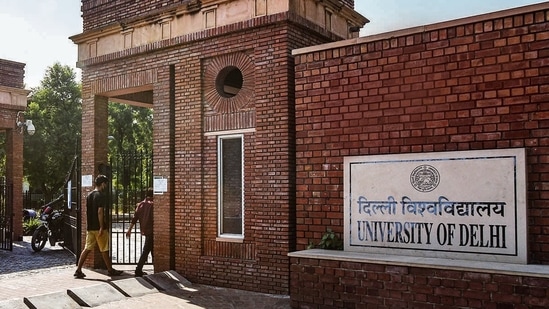Another year away from campus for DU’s second-year undergraduate students
New Delhi: New Delhi: When Satyajit Kumar, a resident of Bodh Gaya in Bihar, got admission to the undergraduate History course in Delhi University’s St. Stephen’s College last year, his happiness knew no bounds. One year later, the teenager is yet to visit the campus. His second-year lessons, like his first-year, are slated to begin Monday online.
New Delhi: When Satyajit Kumar, a resident of Bodh Gaya in Bihar, got admission to the undergraduate History course in Delhi University’s St. Stephen’s College last year, his happiness knew no bounds. One year later, the teenager is yet to visit the campus. His second-year lessons, like his first-year, are slated to begin Monday online.

“When I got admitted to the college, I was looking forward to visit the campus because it is one of the best colleges in the country. I was expecting some exposure and development but nothing like that has happened. There has been no intellectual growth since graduating school. We have been hearing that classes might resume in offline mode soon in the university. If that doesn’t happen, another year will be wasted,” said Kumar, 18.
Several other DU students that HT spoke to expressed similar concerns.
Classes for second-year UG students are set to begin from Monday in online mode. Universities and colleges in the capital have been closed since March last year due to the Covid-19 pandemic. Several stakeholders, including teachers and educationists have expressed concerns over the learning deficits that will arise due to prolonged closure of colleges.
Harjeet Kaur Bhatia, former head of department of educational studies at Jamia Millia Islamia’s Faculty of Education, said, “No doubt there will be learning deficits along with emotional and social gaps. Many students do not have access to online learning and access does not just mean devices but also the ability to understand the texts. Students may be able to access certain texts but may not necessarily understand it. A blended mode of learning can be considered for students under which a small number of students could be allowed to visit campus after consulting all stakeholders and connect with teachers and peers.”
A few DU principals have also held meetings with their staff to discuss how to proceed this academic year. Bijayalaxmi Nanda, principal of Miranda House, said, “During an academic committee meeting with teachers, we decided that at least partially vaccinated students can come to college for assistance and access the library after taking due permission. We have also been conducting tutorials in open-air areas. If we have a sizeable number of vaccinated students ask for lab access, that too might be arranged. Focus will also be on peer mentoring, providing more detailed lesson plans for the semester so that students know where they are going in the courses, and even greater internet support for teachers on campus.”
Several teachers said that adapting the second-year syllabus for the online module helped them prepare for this session as well. Ashok (first name), who teaches Physics at Atma Ram Sanatan Dharma college in south campus, said students faced issues last year while following science experiments in virtual laboratories.
“We have been recording videos of teachers performing experiments in college laboratories and sharing with the students. We had adapted the second-year syllabus last year for the then second-year students and the same will be used this year. There is only so much we can do due to the limitation of the online mode. Classroom teaching cannot be replaced with online learning,” he said.
Tanvir Aeijaz, who teaches Political Science in Ramjas College, and is also the general secretary of the college staff council, called for holding offline classes once or twice a week for those students who are not able to attend online classes. “During a staff council meeting, we came to a conclusion that there should be a concerted effort to include students who are being excluded from the online teaching-learning process. Even those who are able to attend online classes are facing obstructions due to issues like poor connectivity, lack of internet services, home-based study, and lack of access to university facilities like libraries. Online libraries require a lot of internet data which might not be feasible for all.”






